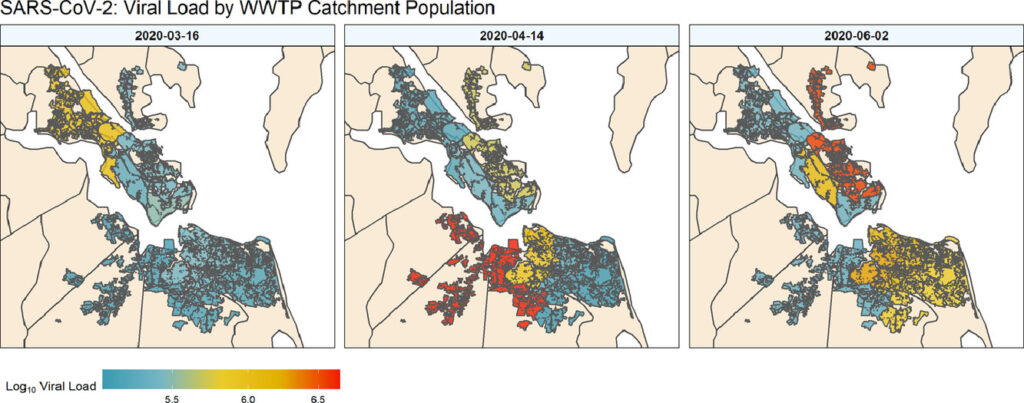Wastewater surveillance has shown success in monitoring for COVID-19 outbreaks, based on ongoing initiatives underway in Charlottesville and the Hampton Roads area. Two VBC members – Hampton Roads Sanitation District (HRSD) and the Rivanna Water and Sewer Authority – are at the forefront of this work. This work could prove even more valuable for predicting outbreaks in other closed campuses and other specific communities that may be underserved. In areas with great health or accessibility disparities, monitoring the wastewater would give some indication about the extent of an outbreak.
Based on demonstrated research at the Hampton Roads Sanitation District (HRSD), it is possible to map the evolution of the epidemic over time. Raul Gonzalez, Environmental Scientist, at HRSD, has generated what is likely to be the single best data set in the world for mapping the pandemic by wastewater surveillance. The map is color coded over time for viral load in the sewer system. Prior to the COVID outbreak, Gonzalez was testing for other organisms. When COVID-19 hit, it was a simple switch for him to make.
With his background, Dr. Brent French, Professor of Biomedical Engineering, UVA, was eager to develop research and learn what wastewater can tell us about COVID outbreaks. In collaborating with the School of Data Science at UVA, Dr. French and the UVA team conceived of a project that aims to predict the epidemiological outbreaks of COVID.
The benefit of this research is its timeliness.
COVID is of course spread by respiratory droplets; the virus then percolates through the human body, including the digestive tract, meaning that feces contain a significant number of viral particles. Currently, doctors are asking individuals with COVID symptoms to wait 7-10 days before getting tested. Once you account for the waiting period after the test has been taken, there can be up to a two-week delay in receiving results.
Wastewater testing, however, could have a week’s advantage compared to traditional testing. Dr. French’s goal is to be able to predict when a contained and stable environment may become unstable, and to what extent in a timely manner – this is especially valuable when testing times may be slower due to accessibility and availability of tests, especially now during the holiday season.
Additionally, Amy Mathers, Associate Professor of Medicine and Pathology, UVA, has been working on sampling the water in the dormitories at UVA, as well as some assisted living homes. Prior to the COVID outbreak, Mathers was tracking pseudomonas in the hospital, trying to work against the viruses/bacteria that linger in the drains of surgery suites. Similarly, to Gonzalez, she was able to pivot her work when the COVID outbreak began.
The Biocomplexity Institute at UVA is also working on epidemiological modeling. They are inputting the case counts from the VDH and funneling it into predictive models to predict a surge. French’s team is using information like this in tandem with additional inputs, such as assessing the viral load in the sewer water to see where compliance issues might be greatest. When assessing the health of a community as a whole, it is important to see how responsive the population is to the latest safety guidance.
French began this research in September; the project is funded for one year with the possibility of extended funding. French views wastewater surveillance as having the most potential in situations where there are not enough swab tests to go around. In cases like these, wastewater surveillance could come into play as a complementary way to monitor the problem.
“Exactly when and where you need wastewater testing depends largely on how well the system for individual testing is working. If individual testing fails to provide adequate coverage for underserved populations, or if the system gets overwhelmed, this is where wastewater surveillance could prove to be most valuable,” Dr. French said.
You may read more about the ongoing research in Charlottesville in partnership with Rivanna Water & Sewer Authority and UVA and in the Hampton Roads Sanitation District. Additionally, please visit the VBC website to find land application safety and management information, guidance, and resources regarding COVID-19.
